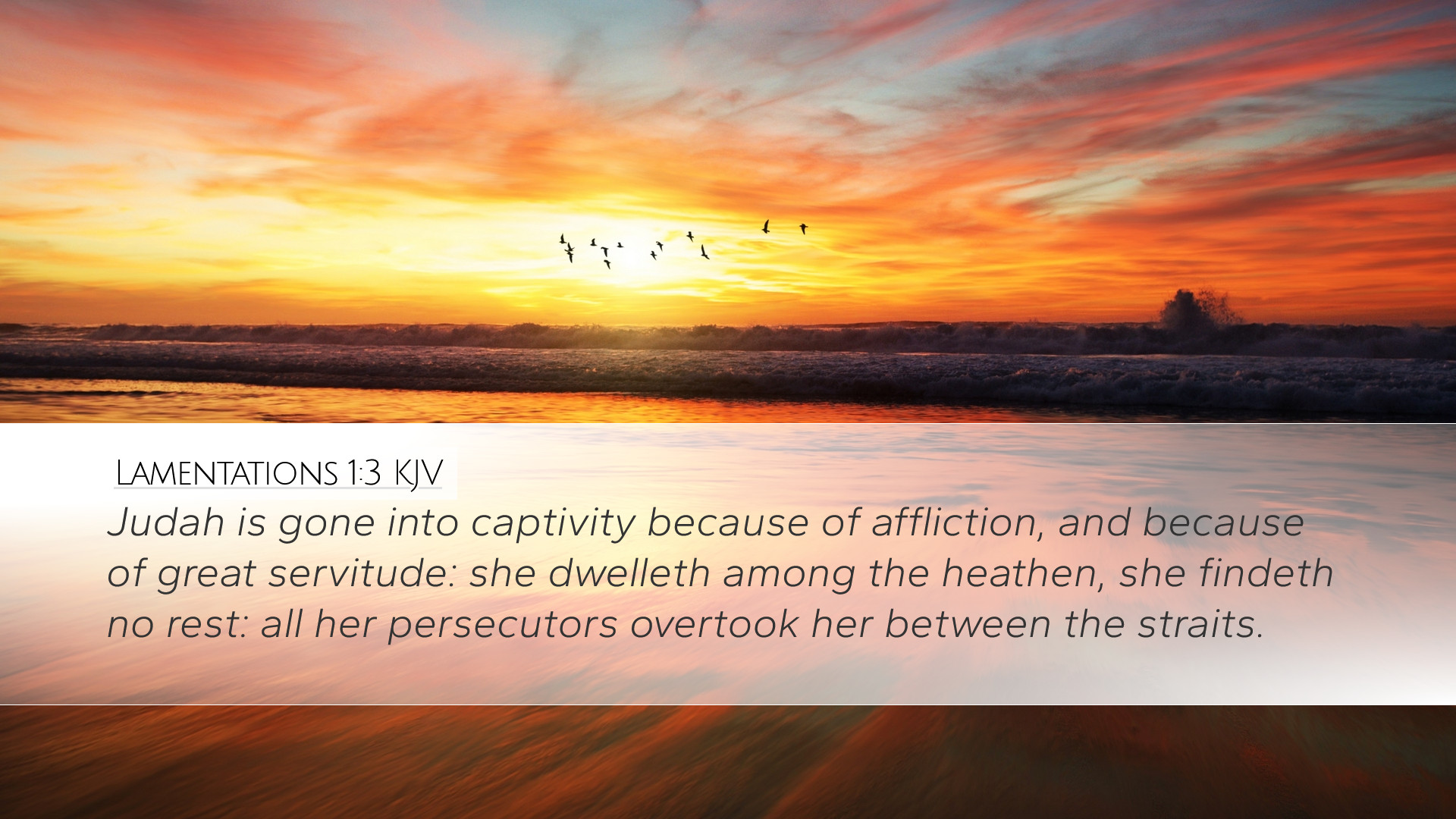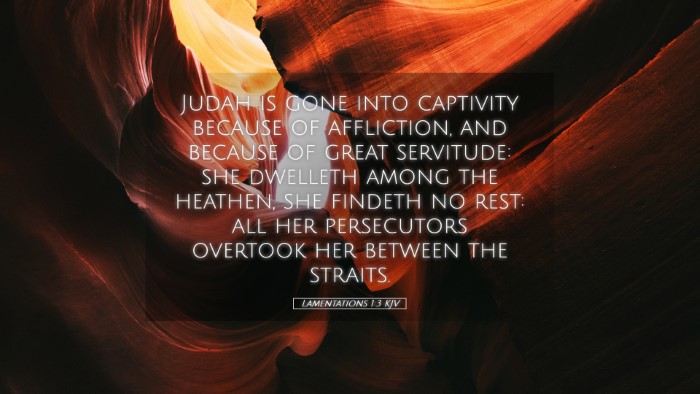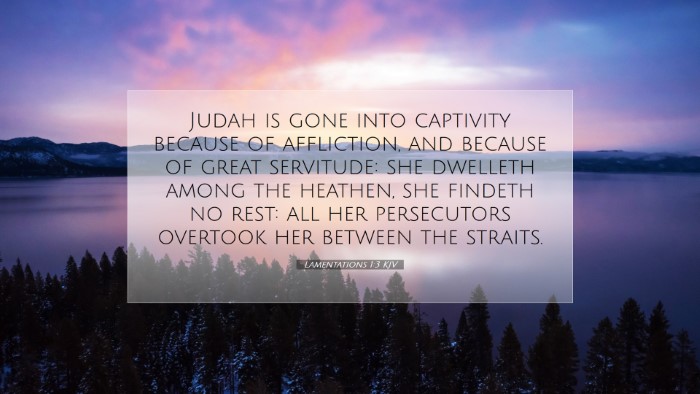Lamentations 1:3 Commentary
Verse: "Judah is gone into captivity because of affliction, and because of great servitude: she dwelleth among the heathen, she findeth no rest: all her persecutors overtook her between the straits."
Introduction
The book of Lamentations is a poignant reflection on the destruction of Jerusalem and the suffering of its people. Lamentations 1:3 encapsulates the themes of exile, affliction, and lament. This verse serves as an important touchstone for understanding the lived reality of Judah during this dark time. The commentaries by Matthew Henry, Albert Barnes, and Adam Clarke each provide rich insights that enhance our understanding of the text.
Exposition of the Verse
Lamentations 1:3 highlights three primary aspects of Judah's situation: captivity due to affliction, dwelling among the heathen, and the overwhelming experience of persecution.
1. Captivity Due to Affliction
“Judah is gone into captivity because of affliction”
-
Matthew Henry: Henry notes that the captivity of Judah was not merely political but also a divine judgment resulting from persistent sin and disobedience to God. He emphasizes the chastening aspect of affliction, wherein God uses suffering to redirect His people back to Him.
-
Albert Barnes: Barnes adds that this affliction refers not only to physical hardships but also to spiritual desolation. He explores the implications of being in captivity: a loss of identity and heritage. This state of captivity is indicative of the broader theme of human suffering as a consequence of sin.
-
Adam Clarke: Clarke expands on the idea of affliction, pointing out that it reflects a spiritual state of abandonment felt by the people. Their suffering is profound, representing both a physical and emotional weight that results from their lost relationship with God.
2. Dwelling Among the Heathen
“She dwelleth among the heathen”
-
Matthew Henry: Henry warns of the dangers of assimilation that occurs when God's people find themselves among those who do not know Him. The people of Judah faced moral and spiritual degradation in their new surroundings. This exile serves as a cautionary tale for believers today regarding the influence of secular cultures.
-
Albert Barnes: Barnes elucidates that dwelling among the heathen represents a loss of spiritual heritage. The idea that Judah must live among nations that do not worship the God of Israel reflects a deep sense of loss and isolation. Barnes notes the psychological impact of this social dislocation and disenfranchisement.
-
Adam Clarke: Clarke emphasizes the loneliness experienced in exile. Living among the heathen was not just physical displacement but also a spiritual exile, severing the people from their religious practices and communal identity. The longing for home becomes a significant theme in their lament.
3. Finding No Rest
“She findeth no rest”
-
Matthew Henry: Henry underscores the emotional and psychological turmoil that the people of Judah endure. This verse captures their distress; they are constantly in a state of unrest, both externally from their captors and internally from their guilt and sorrow.
-
Albert Barnes: Barnes notes that the inability to find rest symbolizes a deeper existential crisis for Judah. They had lost the peace that comes from being in favor with God, and their current state reflects the disarray of both their nation and souls.
-
Adam Clarke: Clarke points out that the promise of rest, often associated with the blessings of God, is notably absent in this passage. He compares this longing for rest with the spiritual rest that believers find in Christ, contrasting the state of the exiled Judah with the peace available to those who trust in God today.
4. Persecutors Overtaking Her
“All her persecutors overtook her between the straits”
-
Matthew Henry: Henry interprets the onslaught of persecutors as symbolic of the relentless nature of sin and opposition to God's people. He warns against underestimating the power of the enemy that surrounds believers, emphasizing the need for vigilance.
-
Albert Barnes: Barnes suggests that "between the straits" indicates an inability of Judah to escape their predicament, trapped in their anguish. This theological point can reflect on the believer's own struggles against sin and persecution, emphasizing the grace needed to endure.
-
Adam Clarke: Clarke reflects on the imagery of "the straits" as a representation of desperation. He paints a picture of a people cornered by their enemies, illustrating how their past choices have left them vulnerable and alone. This serves as a warning to believers about the consequences of turning away from God.
Theological Implications
This verse serves as a sobering reminder of the consequences of collective sin and disobedience. The plight of Judah encapsulates the despair that often accompanies disconnection from God. Furthermore, the reflections provided by these commentators encourage contemporary readers to consider the social, spiritual, and emotional ramifications of faithlessness.
Application
The lessons in Lamentations 1:3 resonate deeply with modern believers. The call to examine our spiritual condition, the dangers of cultural assimilation, and the need for spiritual rest are ever-present themes. Moreover, the reality of persecution and spiritual suffering remains relevant, prompting Christians to seek refuge in God and rely on His strength in times of weakness.
Conclusion
Lamentations 1:3 powerfully encapsulates the pain of exile and the longing for restoration. Drawing from the insights of Henry, Barnes, and Clarke, we are invited to reflect on our own spiritual status, the implications of our choices, and the comfort that can be found in God amid our afflictions. As we process the truths contained in this verse, may we be inspired to seek holiness, to remain steadfast in faith, and to offer compassionate support to those around us who are struggling.


